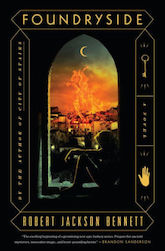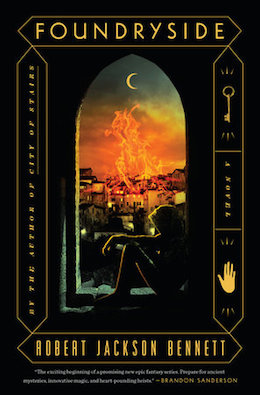If there’s one thing I’ve learned reading Robert Jackson Bennett, it’s that when you think you know what he’s going to do at any given moment, you’re most likely going to be wrong. You think he’ll go right; he goes left. You think he’s going to climb a fence, and instead he barrels right through. Most often, when he hits a dead end and you suspect this is where you catch him, he grins, steps onto the empty air and begins to walk into the sky.
And in his latest novel, Foundryside, Bennett is firing on all cylinders, taking what at first seems to be something a little standard, a little rote, and infusing exhilarating new life into it through expert writing, complicated and distinct characters, and an intriguing, deadly, wonderful new city called Tevanne, where reality can be shuffled like a deck of cards, provided you can justify it.
See, in Tevanne, there exists a form of magic called scriving. Utilizing a complicated alphabet left behind by ancient, almost mythological figures called the Hierophants, mankind has figured out how to imbue everyday objects with something akin to sentience and convince these objects to do work for them. Some scrivings can convince wheels to move across flat surfaces as though they were rolling downhill. Others tell a sword that it is as sharp as ten blades in one, capable of cutting through nearly anything. Others tell a candle that it can never burn out. And in this world of scrivings, the four major Merchant Houses all vie for dominance in their enormous campuses, while outside of them, people like Sancia Grado cobble together enough to survive.
At least Sancia has a unique skillset: she’s a thief of high regard, and she’s damn good at what she does. Foundryside starts with her breaking into the docks of the Merchant Houses and working to steal something for what seems like a client in one of the rival houses. But what she finds inside is unlike anything she’s ever seen. A golden key of incredible power, and its own unique personality, one could say. Unsure of letting it fall into the hands of a House, even her client, Sancia stumbles into a plot years in the making, which could spell disaster for everybody in the city, if not the world. She’s going to have to use her own special abilities, the key around her neck, and anyone willing to help a thief from Foundryside, to stop it.
While on the surface this seems like a story we’ve seen before, Foundryside is immediately infused with Bennett’s eye for unique systems of magic, what makes people complicated beyond just being good or bad, and a city that has been pushed so far past being a capitalist dystopia, it’s a wonder it’s still functional. Sancia has what is essentially an invisible, chronic illness that only gets worse the more she pushes herself. She steals to make enough money to survive, and this latest operation can maybe get her enough to see if her illness can be treated. She runs through the maze that is Tevanne at a careful speed, never above causing destruction to get what she needs, but also trying very hard not to get anyone killed in the process. She’s a loner by necessity and by choice, though from the minute she finds this golden key, Bennett begins to challenge not only everything she knows, but everything she has come to learn and think about herself. She must ask for help. She must try to do the right thing. She must stay and fight. The success of Foundryside can be found in the slow way Bennett peels back Sancia’s character, revealing hidden layers and a history of pain, oppression, and violence that she tries to hide from everyone, even herself. While saying more would potentially spoil some things, the central message of Sancia’s character arc is one I should’ve seen coming, didn’t, and was devastated to read, finally realizing Bennett’s goals for her. Sancia’s journey is wonderful to watch, and her potential narrative paths for the sequel are fascinating. I can’t wait to see where Bennett takes her.
Buy the Book


Foundryside
Bennett’s depth of character doesn’t just begin and end with Sancia, though. Tevanne and the entirety of Foundryside is populated with rich, complex people, like Gregor Dandolo, son of a Merchant House matriarch who seeks justice in a city that would sooner ignore crime than fight to stop it. Or Orso Ignacio, the Dandolo Hypatus, who fled one Merchant House for another, who struggles to unlock the mysteries of the Hierophants along with his scriving assistant Berenice, whose mind is even faster and sharper than his own. There’s Estelle Candiano, sold off daughter of a House Merchant lord, whose history with Orso is complicated, and whose scriving talents are ignored because she’s a woman in a city run by foolish men. And then there’s Clef. But the less said about him, the better; I’ll simply say he’s one of my favorites in the novel, for obvious reasons. Foundryside lives and dies on its characters, and Bennett’s novel more than thrives with the people he focuses on.
Foundryside is an excellent first novel in what promises to be another home-run series for Bennett. His characters are smart and engaging, his world is complex and dark though not without hope, and his story packs a punch, especially as we rocket toward the sequel in the closing pages. If you’ve never read any of his work, or worried it may not be your thing, trust me: Foundryside is your thing, and you’re going to enjoy your time here. Just keep watch out for any scrivings. Those things really do turn up in the darnedest places.
Foundryside is available August 21st from Crown.
Martin Cahill is a contributor to Tor.com, as well as Book Riot and Strange Horizons. He has fiction forthcoming at Beneath Ceaseless Skies and Fireside Fiction. You can follow his musings on Twitter @McflyCahill90.










